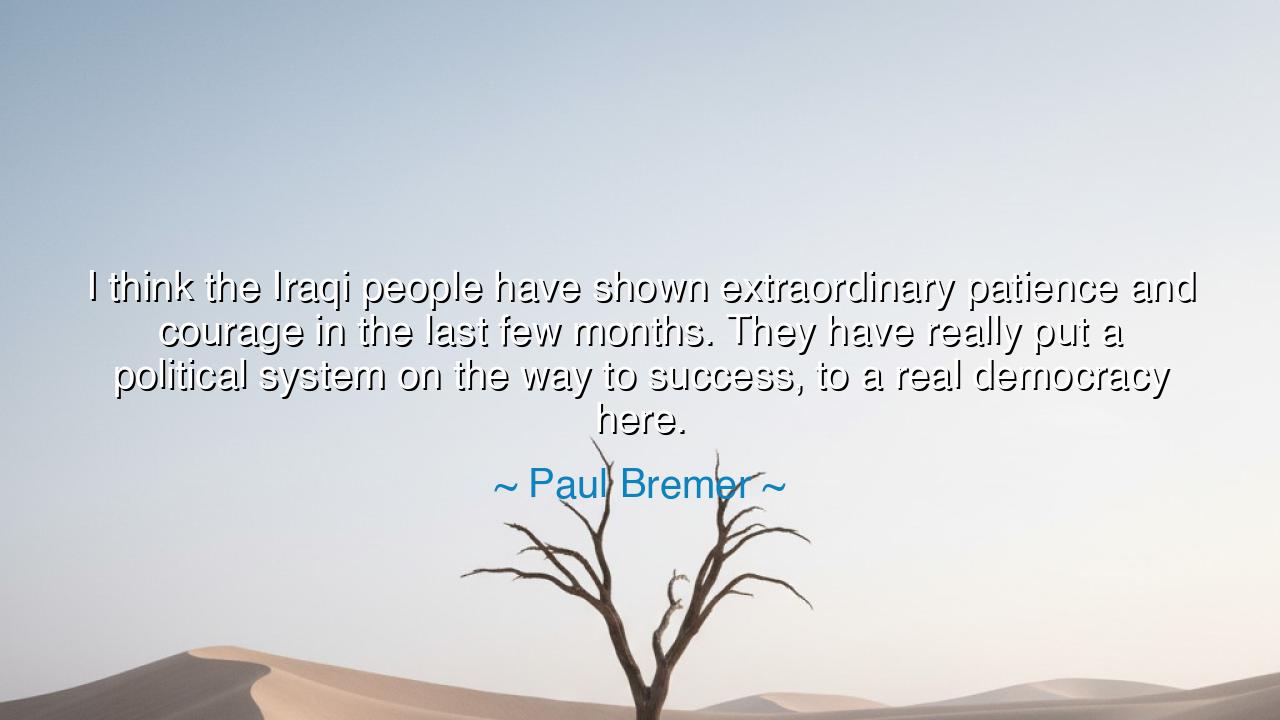
I think the Iraqi people have shown extraordinary patience and
I think the Iraqi people have shown extraordinary patience and courage in the last few months. They have really put a political system on the way to success, to a real democracy here.






When Paul Bremer said, “I think the Iraqi people have shown extraordinary patience and courage in the last few months. They have really put a political system on the way to success, to a real democracy here,” he spoke as a witness to one of the most turbulent and transformative chapters in modern history. His words were not spoken lightly—they were born of war, of chaos, and of hope struggling to survive amid ruins. Bremer, who served as the administrator of Iraq after the fall of Saddam Hussein, saw firsthand a nation torn apart, yet refusing to surrender its spirit. In his praise, he recognized that the building of freedom is not achieved through conquest or decree—it is built through courage, patience, and the unyielding will of a people determined to rise from their own ashes.
The origin of this quote lies in the early years following the U.S.-led invasion of Iraq in 2003. The old order had fallen, and in its place was uncertainty. Streets were filled with both hope and fear; the air itself was thick with questions. Could a people long ruled by tyranny learn again the art of freedom? Could they bear the growing pains of democracy, with its trials and its chaos, and still believe in the promise of self-governance? Bremer, as the chief civil administrator, witnessed both the triumphs and the tragedies of this transformation. His words came as both recognition and encouragement—to honor the extraordinary courage of those who dared to vote, to speak, to rebuild, even while the ground beneath them trembled.
The Iraqi people, in those difficult years, embodied a truth as old as humanity itself: that liberty is not born in peace, but in struggle. When Bremer spoke of their patience, he acknowledged a virtue as rare as it is vital. For patience is not passive; it is endurance with purpose. It is the farmer who plants seeds even in drought, believing that rain will come. It is the mother who shelters her children while the world burns outside. The Iraqis, facing violence and instability, did not turn from the dream of freedom. Their courage was not the loud kind that charges into battle, but the quiet kind that wakes each morning and chooses to keep believing in tomorrow.
This idea—of rebuilding amid destruction—is not new to the world. History has seen nations fall and rise again through the perseverance of their people. Consider Germany and Japan after the Second World War. Both lay in ruins, their cities shattered, their spirits broken. Yet within a generation, they rose again, not through conquest, but through labor, unity, and faith in renewal. In the same way, the Iraqis were asked to plant the seeds of democracy in barren soil. Bremer’s words echo the ancient understanding that greatness is not measured by victory alone, but by resilience—the ability to begin again when the world has ended.
To speak of a “real democracy” is to speak of something fragile yet divine. Democracy is not a gift that can be imposed; it must be grown, nurtured, and protected. It requires patience when progress is slow and courage when ideals are tested. The Iraqi people, through their sacrifices, reminded the world that freedom cannot be imported—it must be lived. Every vote cast amid danger, every hand that reached out to build instead of destroy, was a step toward something sacred. Bremer’s recognition of this was not only political, but profoundly human. He saw in them the universal struggle of mankind—the desire to shape one’s own destiny.
Bremer’s wisdom calls us to remember that freedom, whether for a nation or an individual, is always costly. It demands endurance through suffering and faith amid despair. The patience he spoke of is the same patience that built civilizations—the willingness to wait for harvest, even when storms destroy the field. The courage he admired is the same courage that has guided all peoples who have sought justice in the face of oppression. And in this, Iraq’s struggle becomes a reflection of all human striving—for peace, for dignity, for a voice that cannot be silenced.
So, my children of endurance and hope, take this lesson to heart: every act of courage, no matter how small, builds the foundations of freedom. Every moment of patience in hardship strengthens the roots of democracy, whether in a nation or within the soul. Do not despise the slow work of change, nor lose faith when progress seems distant. For as Paul Bremer observed, greatness is not born in comfort—it is born in perseverance. Let his words remind you that to rebuild after destruction, to hope after loss, to act with integrity even when the world trembles—this is the essence of both courage and greatness.
And thus, when you face your own storms—whether in your country, your work, or your heart—remember the spirit of those who rebuilt amid the wreckage. Stand firm. Be patient. Be brave. For it is through such valor of the everyday soul that all nations, and all people, find their way to a brighter dawn.






AAdministratorAdministrator
Welcome, honored guests. Please leave a comment, we will respond soon